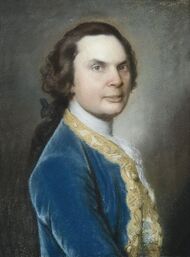Stolz de Herzohg - Anthem of the Independent Duchy of Kårlsberg
History of the hymn
The hymn was written in 1778 by Gottschalk Kuno von Ostrovskis and later issued as the hymn of the Kårlsberg family, but at that time there was already a strict family hierarchy, which gave the duchy the name of the family: Duchy of Kårlsberg. When the Duchy was closed by the Russian Consulate General in Latvia in 1790, the Kårlsberg family lost all their lands and possessions, except patriotism and the anthem. In 2022 the micronation was proclaimed again and the anthem "Stolz de Herzohg" was recorded again. "Stolz de Herzohg" means "Pride to the Duke" in Kårlsberg German.
Gottschalk Kuno von Ostrovskis
Gottschalk Kuno von Ostrovskis was born in 1750 in Hønesund in the Duchy of Kårlsberg. As the son of a housewife and a farmer, he was not initially expected to have a special career. Nevertheless, Gottschalk quickly developed a certain interest in rhythms and sounds, and when at the age of 4 he was invited by a village music teacher to play the organ in the village chapel, the boy's talent was quickly discovered. In his later years, after an education and graduation from the college in Talinn, Estonia, he served as the court musician in the duke's house of Kårlsberg, which ensured the survival of him, his parents and family. In gratitude for the Duke's fair treatment, he wrote the anthem for the Kårlsberg family at the age of 26. He continued to live his life in the Kårlsberg court until he passed away at the age of 67 in Riga, Latvia.

Use of the anthem in times of the duchy
In 1776, when the Kårlsberg family declared independence, they used local and non-local German folk songs to represent patriotism and pride in a musical way. Then in 1778, when the Duchy's House of Lords commissioned the hymn "Stolz de Herzohg", Gottschalk Kuno von Ostrovskis wrote it. The anthem was then played at every appearance of the duke until 1790.
| 1.Kå ger 2.lv 3.en 4.ger | |
|---|---|
| I diese kostbare Land erkämpfte weer onsere Fraihait',
Generation uim Generàtion sei geseegned, hier jeboren zu sen, Hhier roscht onsa Meer, hhier erglinked unsere Städt', hhier erklinged Aalbæk. Möӣe Kårlsberg uf ewich lebe', Möӣe e 'n de Kron de Herzogs hell' erštrahle'! Auf det' Herzog's Wech z'u' Segehn un Ruhm, Mit der Fahne dit Herzogtums werden wa uf ewich waíderziehe. Wa werde unsre Kårlsberger Faterlande behüte, Jeda' bihs zum letzte' Tropfe' senes Blutes. Möӣe Kårlsberg uf ewich lebe', Möӣe e 'n de Kron de Herzogs hell' erštrahle'!𝄇[2]|- |
Šajā dārgajā zemē mēs cīnījāmies par savu brīvību,
Paaudze pēc paaudzes ir svētīta šeit piedzimt, šeit mūsu jūra čalo, šeit mūsu pilsētas skan, šeit Aalbæk skan. Lai Kērlsbergs dzīvo mūžīgi, Lai tas mirdz hercoga kronī! Hercoga ceļā uz svētību un slavu, Ar maija karogu mēs mūžīgi soļosim. Mēs sargāsim savu Kērlsbergas tēvzemi, katrs līdz pēdējam asins pilienam. |
| In this land most dear we gained our freedom,
Generation upon generation blessed to be born here, Here our sea sighs, here our cities ring out, here Aalbæk resounds. Let Kårlsberg live forever, Let it shine bright in the Duke's crown! On Duke's road to blessings and glory, With the flag of October we will go on forever. We will guard our Kårlsberger Fatherland, Everyone to the last drop of our blood. 𝄆Let Kårlsberg live forever, Let it shine bright in the Duke's crown!𝄇[2] | |
| In diesem kostbaren Land erkämpften wir unsere Freiheit,
Generation um Generation ist gesegnet, hier geboren zu sein, Hier seufzt unser Meer, hier erklingen unsere Städte, hier erklingt Aalbæk. Möge Kårlsberg auf ewig leben, Möge es in der Krone des Herzogs hell erstrahlen! Auf des Herzogs Weg zu Segen und Ruhm, Mit der Fahne des Monats Mai werden wir ewig weiterziehen. Wir werden unser Kårlsberger Vaterland behüten, Jeder bis zum letzten Tropfen seines Bluts. Möge Kårlsberg ewig leben, Lasst es strahlend leuchten in des Herzogs Krone!𝄇[2] |